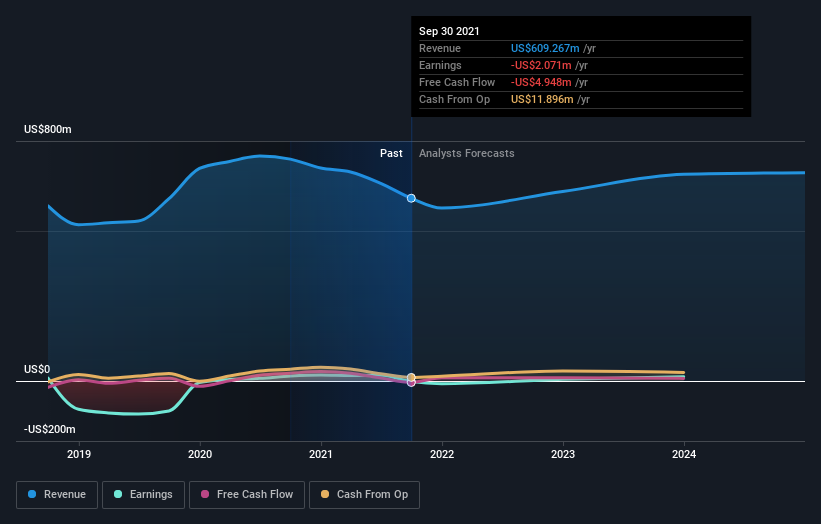- United States
- /
- Construction
- /
- NYSE:ORN
Positive week for Orion Group Holdings, Inc. (NYSE:ORN) institutional investors who lost 43% over the past year

A look at the shareholders of Orion Group Holdings, Inc. (NYSE:ORN) can tell us which group is most powerful. With 59% stake, institutions possess the maximum shares in the company. Put another way, the group faces the maximum upside potential (or downside risk).
Institutional investors would appreciate the 10% increase in share prices last week, given their one-year returns have been disappointing at 43%.
Let's take a closer look to see what the different types of shareholders can tell us about Orion Group Holdings.
View our latest analysis for Orion Group Holdings

What Does The Institutional Ownership Tell Us About Orion Group Holdings?
Many institutions measure their performance against an index that approximates the local market. So they usually pay more attention to companies that are included in major indices.
As you can see, institutional investors have a fair amount of stake in Orion Group Holdings. This implies the analysts working for those institutions have looked at the stock and they like it. But just like anyone else, they could be wrong. If multiple institutions change their view on a stock at the same time, you could see the share price drop fast. It's therefore worth looking at Orion Group Holdings' earnings history below. Of course, the future is what really matters.

Investors should note that institutions actually own more than half the company, so they can collectively wield significant power. Hedge funds don't have many shares in Orion Group Holdings. Brandes Investment Partners, LP is currently the largest shareholder, with 9.9% of shares outstanding. With 6.8% and 4.5% of the shares outstanding respectively, Dimensional Fund Advisors LP and Grace & White, Inc. are the second and third largest shareholders. Additionally, the company's CEO Mark Stauffer directly holds 3.3% of the total shares outstanding.
Looking at the shareholder registry, we can see that 50% of the ownership is controlled by the top 15 shareholders, meaning that no single shareholder has a majority interest in the ownership.
Researching institutional ownership is a good way to gauge and filter a stock's expected performance. The same can be achieved by studying analyst sentiments. Quite a few analysts cover the stock, so you could look into forecast growth quite easily.
Insider Ownership Of Orion Group Holdings
The definition of an insider can differ slightly between different countries, but members of the board of directors always count. Company management run the business, but the CEO will answer to the board, even if he or she is a member of it.
I generally consider insider ownership to be a good thing. However, on some occasions it makes it more difficult for other shareholders to hold the board accountable for decisions.
Shareholders would probably be interested to learn that insiders own shares in Orion Group Holdings, Inc.. In their own names, insiders own US$8.7m worth of stock in the US$105m company. Some would say this shows alignment of interests between shareholders and the board, though we generally prefer to see bigger insider holdings. But it might be worth checking if those insiders have been selling.
General Public Ownership
The general public-- including retail investors -- own 33% stake in the company, and hence can't easily be ignored. While this size of ownership may not be enough to sway a policy decision in their favour, they can still make a collective impact on company policies.
Next Steps:
I find it very interesting to look at who exactly owns a company. But to truly gain insight, we need to consider other information, too. Consider risks, for instance. Every company has them, and we've spotted 2 warning signs for Orion Group Holdings you should know about.
If you would prefer discover what analysts are predicting in terms of future growth, do not miss this free report on analyst forecasts.
NB: Figures in this article are calculated using data from the last twelve months, which refer to the 12-month period ending on the last date of the month the financial statement is dated. This may not be consistent with full year annual report figures.
New: AI Stock Screener & Alerts
Our new AI Stock Screener scans the market every day to uncover opportunities.
• Dividend Powerhouses (3%+ Yield)
• Undervalued Small Caps with Insider Buying
• High growth Tech and AI Companies
Or build your own from over 50 metrics.
Have feedback on this article? Concerned about the content? Get in touch with us directly. Alternatively, email editorial-team (at) simplywallst.com.
This article by Simply Wall St is general in nature. We provide commentary based on historical data and analyst forecasts only using an unbiased methodology and our articles are not intended to be financial advice. It does not constitute a recommendation to buy or sell any stock, and does not take account of your objectives, or your financial situation. We aim to bring you long-term focused analysis driven by fundamental data. Note that our analysis may not factor in the latest price-sensitive company announcements or qualitative material. Simply Wall St has no position in any stocks mentioned.
About NYSE:ORN
Orion Group Holdings
Operates as a specialty construction company in the infrastructure, industrial, and building sectors in the United States, Alaska, Hawaii, Canada, and the Caribbean Basin.
Excellent balance sheet and good value.
Similar Companies
Market Insights
Community Narratives



